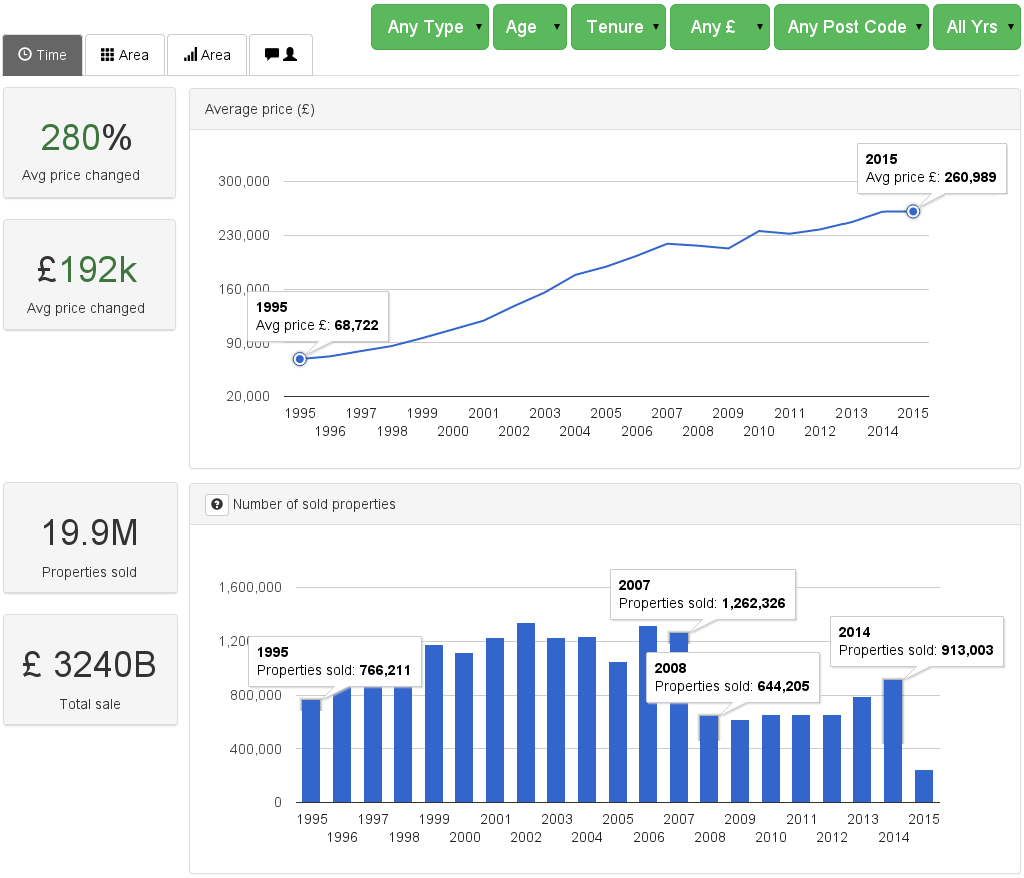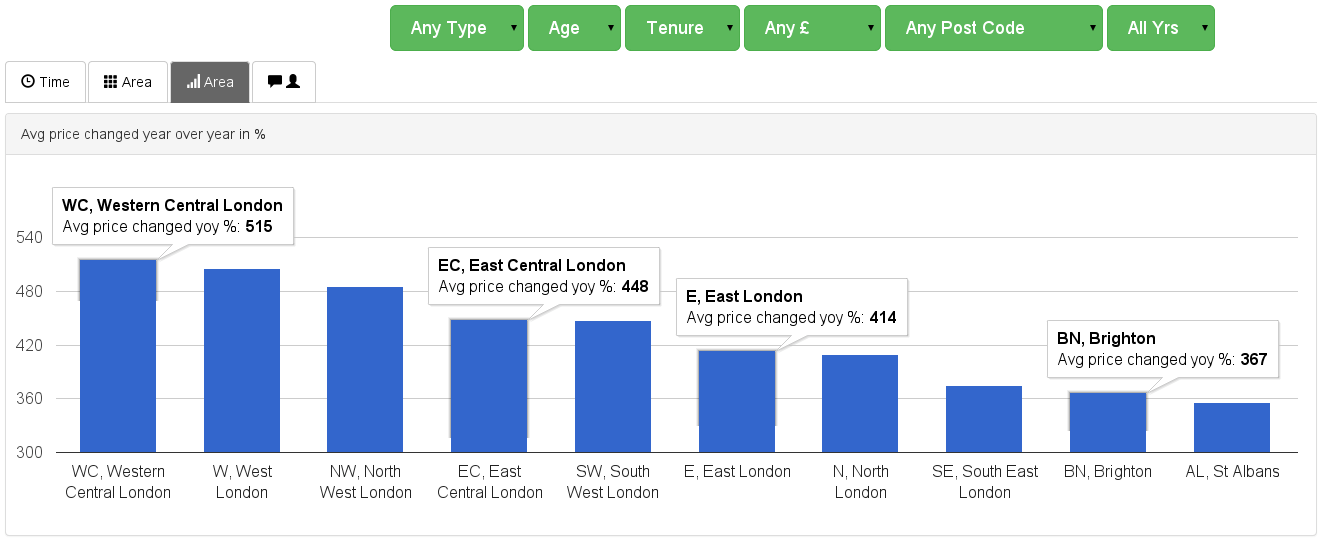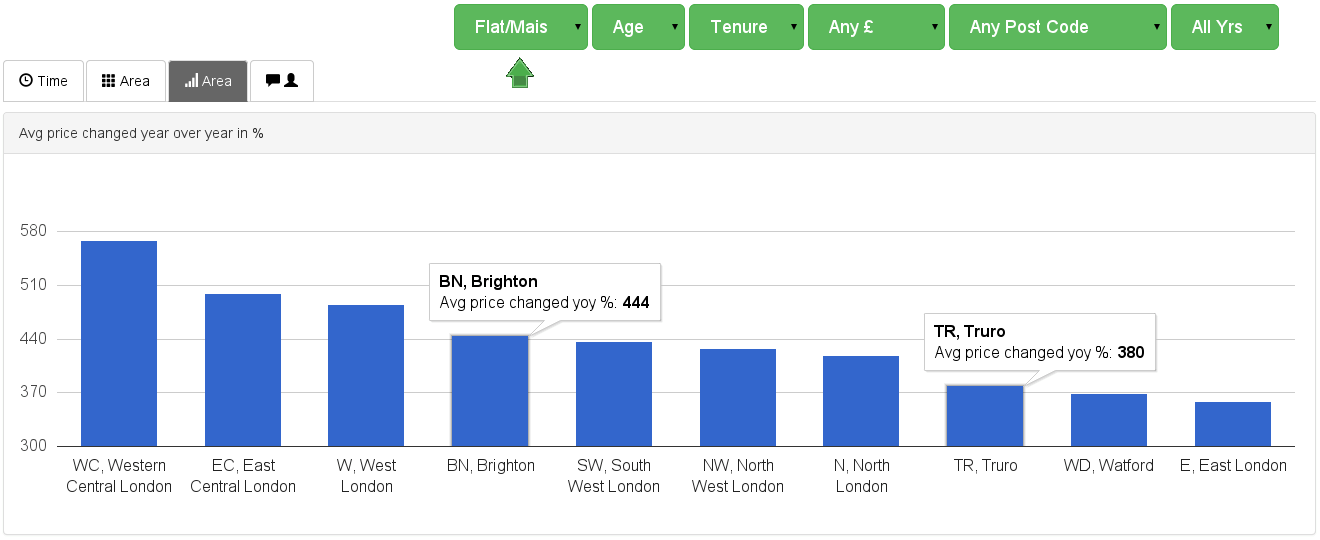England House Prices Sad Story
 Vladimir Makovsky, 2015-07-31
Vladimir Makovsky, 2015-07-31
There are things in life that most of us do just once or twice in a lifetime. Like buying a property. Financially speaking, it's such a large investment, that you really want to get it right. It's said that property investment is both lucrative and safe. However, this claim isn't usually backed by a reasonable amount of data since in many countries it's not easy to get prices of sold properties.
Luckily, in some countries we can verify this assertion on the representative amount of data. In fact, we can have a look at price development in one of the most developed economy in the world. UK government publishes each month paid prices of properties in England & Wales.
The dataset has 20 million sales records since 1995, with the total sale of £3.26 trillion (i.e. 3 million million). It records more than a third of all property transactions in England & Wales (not all of them are recorded). With these data everyone can see real figures. They are used by property websites, but you cannot see aggregated numbers. Thus, we built a live dashboard to explore this dataset using our interactive technology.
 You can see in the dashboard that an average price (London included) in 1995
was £69k while now it's £261k. The annual average wage in 1995
was £13.3k and it's £25k now. So, buying a property of
an average price in 1995 took 5 annual gross incomes
while now it takes 10. If we took the median price it would be
4 incomes in 1995 and 8 in 2015.
You can see in the dashboard that an average price (London included) in 1995
was £69k while now it's £261k. The annual average wage in 1995
was £13.3k and it's £25k now. So, buying a property of
an average price in 1995 took 5 annual gross incomes
while now it takes 10. If we took the median price it would be
4 incomes in 1995 and 8 in 2015.
Overall in the last 20 years the average price grew up each year except the years 2008 (-1%,-£2.5k), 2011 (-2%,-£3.5k) and 2009 (-2%,-£3.6k). The highest year over year price growth was in 2004 with +15% (+£22.9k).
Price change by postal code
Let's have a closer look on how prices changed in some postal codes over the last years. The region with the lowest increase is Durham where prices grew up by 168% (e.g. on average what used to cost 100k in 1995 now costs 268k in 2015). Nevertheless the price has been oscilating around the current value since 2006.
If you look at the property as an investment,
London is a clear winner. In the top 10 postal codes, only
Brighton is outside of London area. Prices in the top
10 locations grew up by 350% or more in the last 20 years.

In May of this year, the winner postal code was WC London with 515% prices growth. In the last year, there were 380 sales. The average price reached staggering £1.06 million (£700k median price). This year the price dropped by 16% to £884k (£675k median price). West London took the first place in June with 531% increase with the average price of £1.01 million (£665k median price).
 But London is not the only place where there is really high increase.
Considering flats only, Brighton actually goes to the 4th place with 444% growth (£40k in 1995, £219k in 2015).
Also, Truro squeezes into top ten with 380% growth (£42k in 1995, £203k in 2015).
But London is not the only place where there is really high increase.
Considering flats only, Brighton actually goes to the 4th place with 444% growth (£40k in 1995, £219k in 2015).
Also, Truro squeezes into top ten with 380% growth (£42k in 1995, £203k in 2015).
Can we expect prices to drop?
To sum it up, on average buying a house in England is a safe investment. The property prices grew up higher than the inflation. The growth is not so surprising when we consider England is already the second most crowded major country in the EU. The population grew up by more than 10% in the last 20 years. Based on the presumption the population growth is expected to continue, significant prices decrease is implausible in the coming years.
But this development has also an important downside. Buying own property on average is two times less affordable than it was 20 years ago. With growing population, the standard of living is going down. The latest Guardian article "Generation rent" illustrates previous findings. Let me cite Arthur, age 36, Ph.D., dad: "The rental market in the UK is out of control - there are no other words for it. Buying a house is nowhere near an option, but the alternative, renting, is not viable either. I feel that at every corner agencies are trying to shake me down for more money - ever higher rents and ever rising fees."